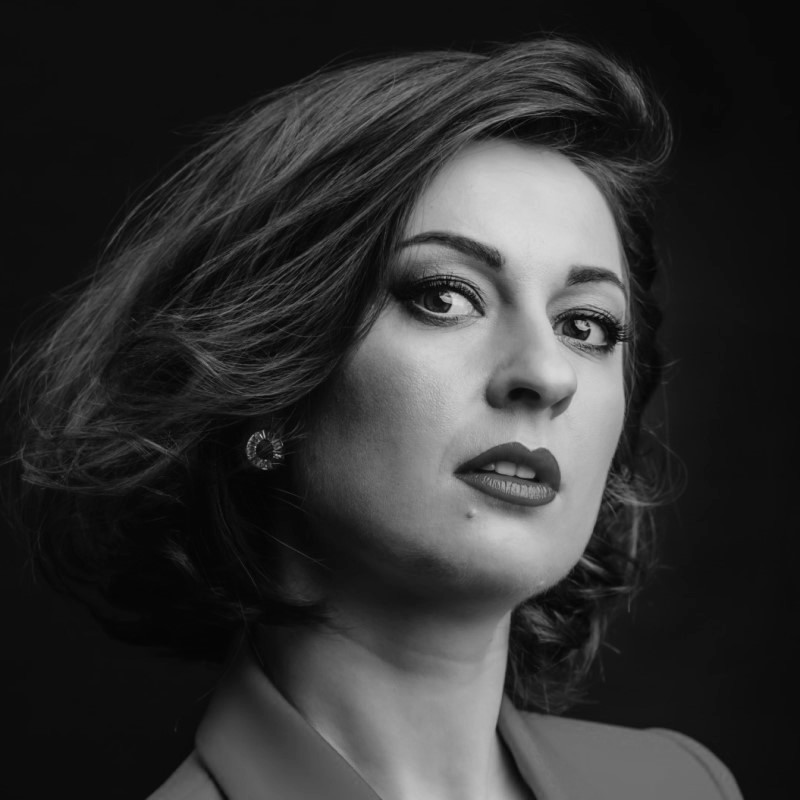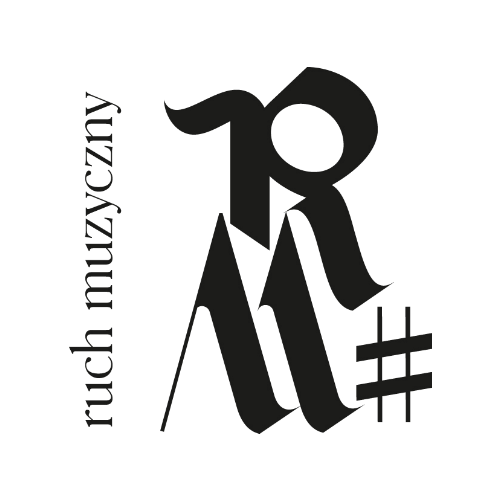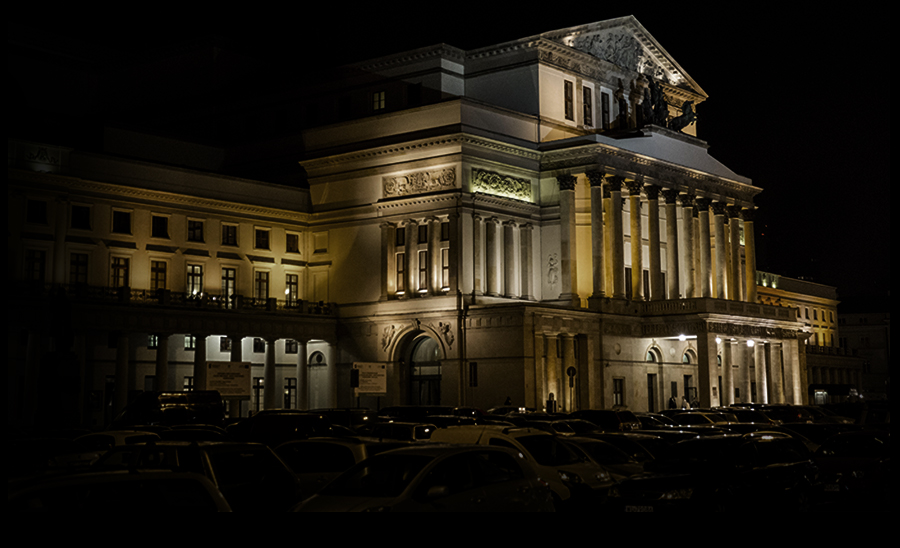Così fan tutte
Wolfgang Amadeus Mozart
Opera buffa in two acts
Libretto: Lorenzo da Ponte
World premiere: 26 January 1790, Burgtheater, Vienna
Premiere of this production: 15 March 2024, Polish National Opera
In the original Italian with Polish and English surtitles
The production includes erotic scenes.
A frivolous comedy or an immoral farce? Così fan tutte was surrounded by controversy almost from the opera’s inception. Staged for the first time in 1790 in Vienna, the work by Wolfgang Amadeus Mozart was reportedly inspired by a real-life scandal that shook Paris: an extramarital affair between the young wife of Guillaume Kornman, an influential banker (and the founder of a society that promoted Anton Mesmer’s programme of animal magnetism). The librettist, Lorenzo da Ponte, set the story in 18th-century Naples and focused on a single theme. Don Alfonso makes a bet with his his younger friends, Ferrando and Guglielmo, that their women they love, Dorabella and Fiordiligi, will not stay faithful when two men suddenly leave for the war. The intrigue is all the more believable as Austria is in an armed conflict with Turkey. The men also let in Despina, the maid, on their conspiracy. After a tearful goodbye with their fiancées, Ferrando and Guglielmo return home disguised as Albanians to test the ladies’ loyalty.
Così fan tutte is an opera buffa that sparkles with wit and humour but can also strike lyrical tones. Da Ponte’s story was accused of superficiality, cynicism, and immorality. Considering the 18th-century theatre conventions, however, it can be interpreted as an Enlightenment tale about human nature that boils down to the sentiment summarised in the final lines of the libretto: ‘Happy is the man who looks at everything on the right side […] What always makes another weep will be for him a cause of mirth.’ The composer moves the plot briskly forward by combining solos, duets, and larger ensembles in such a way that each act seems be an uninterrupted dramaturgical whole. Thanks to the music, the seemingly wooden characters turn into full-blooded protagonists that you simply cannot resist: cheeky Fiordiligi, happy-go-lucky Dorabella, tender Ferrando, impatient Guglielmo, cynical Alfonso, and temperamental Despina.
Following the success of his take on Piazzola’s Maria de Buenos Aires, this is Wojciech Faruga’s second production for the Polish National Opera, this time meant for the main stage. The director has decided to approach Mozart’s work seriously – after all, Così fan tutte is not only about chucklesome love adventures. The comedy convention is just smoke and mirrors that disguises real social issues. Faruga’s staging is set in America in the 1960s and 70s. The story centres on a high-profile bourgeois family, foregrounding Despina and Don Alfonso, an army veteran, who follow the exploits of Dorabella, Fiordiligi, Guglielmo, and Ferrando. Running parallel to the love story is war, a space of disintegration and negation of all principles other than ‘might is right’. In this take on the opera, war is not only a pretext that enables Ferrando and Guglielmo’s charade but Alfonso’s personal experience. Ferrando and Guglielmo, who pretend to enlist only to return in disguise promptly after, are portrayed as rebels liberated from the social conventions. Is it a transformation or cosplay? An innocent ruse becomes a dangerous game that reveals hidden fantasies. The idea of interpreting the opera through references to the panorama of a specific time and place opens up the possibility of looking at the developments of the modern era in the context of the lost opportunities and unfinished moral and social revolutions of the past century. How will this adventure end? Is a return to the rule-governed world of tradition possible?
Do we need to see a looming spectre of catastrophe to take it upon ourselves to imagine and foster a different reality and different loves?
Cast
Credits
Sponsors
-
Patrons of the Polish National Opera | Partners of the Opera Academy
-
Partners of the Polish National Opera
-
Media patrons
-
Media partner






![[Translate to English:] proj. graf. Adam Żebrowski [Translate to English:] proj. graf. Adam Żebrowski](/fileadmin/_processed_/8/a/csm_Cosi_fan_tutte_B-1_PREVKA_small_f18b8db76d.jpg)
![[Translate to English:] fot. Natalia Kabanow [Translate to English:] fot. Natalia Kabanow](/fileadmin/_processed_/2/8/csm_Cosi_fan_tutte__fot-NK__1__a3da3d1301.jpg)
![[Translate to English:] fot. Natalia Kabanow [Translate to English:] fot. Natalia Kabanow](/fileadmin/_processed_/9/7/csm_Cosi_fan_tutte__fot-NK__2__2ce5946fa3.jpg)
![[Translate to English:] fot. Natalia Kabanow [Translate to English:] fot. Natalia Kabanow](/fileadmin/_processed_/4/7/csm_Cosi_fan_tutte__fot-NK__10__c7064d1112.jpg)
![[Translate to English:] fot. Natalia Kabanow [Translate to English:] fot. Natalia Kabanow](/fileadmin/_processed_/f/4/csm_Cosi_fan_tutte__fot-NK__16__30a6ea14fa.jpg)
![[Translate to English:] fot. Natalia Kabanow [Translate to English:] fot. Natalia Kabanow](/fileadmin/_processed_/5/a/csm_Cosi_fan_tutte__fot-NK__17__b17bfbbf23.jpg)
![[Translate to English:] fot. Natalia Kabanow [Translate to English:] fot. Natalia Kabanow](/fileadmin/_processed_/4/1/csm_Cosi_fan_tutte__fot-NK__18__f8a8f785f6.jpg)
![[Translate to English:] fot. Natalia Kabanow [Translate to English:] fot. Natalia Kabanow](/fileadmin/_processed_/c/d/csm_Cosi_fan_tutte__fot-NK__24__653d402e8b.jpg)
![[Translate to English:] fot. Natalia Kabanow [Translate to English:] fot. Natalia Kabanow](/fileadmin/_processed_/0/4/csm_Cosi_fan_tutte__fot-NK__26__09037bc156.jpg)
![[Translate to English:] fot. Natalia Kabanow [Translate to English:] fot. Natalia Kabanow](/fileadmin/_processed_/c/1/csm_Cosi_fan_tutte__fot-NK__29__bec7477dc0.jpg)
![[Translate to English:] fot. Natalia Kabanow [Translate to English:] fot. Natalia Kabanow](/fileadmin/_processed_/d/7/csm_Cosi_fan_tutte__fot-NK__35__d177d72862.jpg)
![[Translate to English:] fot. Natalia Kabanow [Translate to English:] fot. Natalia Kabanow](/fileadmin/_processed_/e/e/csm_Cosi_fan_tutte__fot-NK__37__e5f3645e0e.jpg)
![[Translate to English:] Cosi fan tutte teaser [Translate to English:] Cosi fan tutte teaser](/fileadmin/_processed_/e/9/csm_COSI_FAN_TUTTE_-_teaser_1c48eab397.png)
![[Translate to English:] Cosi fan tutte Mozarta - o czym jest inscenizacja Wojciecha Farugi? [Translate to English:] Cosi fan tutte Mozarta - o czym jest inscenizacja Wojciecha Farugi?](/fileadmin/_processed_/d/2/csm__Cosi_fan_tutte__Mozarta_-_o_czym_jest_inscenizacja_Wojciecha_Farugi__d52a1068a1.png)
 Aleksandra Orłowska
Aleksandra Orłowska ![[Translate to English:] Zuzanna Nalewajek](/fileadmin/_processed_/b/f/csm_Zuzanna_Nalewajek_mini_fot._L._Dyczko_2bc267f7f2.jpeg) Zuzanna Nalewajek
Zuzanna Nalewajek  Pavlo Tolstoy
Pavlo Tolstoy ![[Translate to English:]](/fileadmin/_processed_/1/8/csm_Hubert_Zapior_BIO_fot_Jan_Windszus_-_kwadrat_902a9a1276.jpg) Hubert Zapiór
Hubert Zapiór  Artur Janda
Artur Janda ![[Translate to English:]](/fileadmin/_processed_/8/4/csm_Malesza-Kutny__Anna__c__Karpati_Zarewicz_kwadrat_bw_a51980bc76.jpg) Anna Malesza-Kutny
Anna Malesza-Kutny  Aleksander Teliga Junior
Aleksander Teliga Junior  Yaryna Rak
Yaryna Rak  Łukasz Kózka
Łukasz Kózka  Magdalena Stefaniak
Magdalena Stefaniak  Yaroslav Shemet
Yaroslav Shemet  Martyna Szymczak
Martyna Szymczak  Wojciech Faruga
Wojciech Faruga  Katarzyna Borkowska
Katarzyna Borkowska ![[Translate to English:]](/fileadmin/_processed_/a/8/csm_Bartlomiej_Gasior__-_kwadrat_1ea76cbc82.jpg) Bartłomiej Gąsior
Bartłomiej Gąsior  Mirosław Janowski
Mirosław Janowski ![[Translate to English:]](/fileadmin/import/media/img/ludzie/spiewacy/IZABELLA-KLOSINSKA370.jpg) Izabela Kłosińska
Izabela Kłosińska ![[Translate to English:]](/fileadmin/_processed_/0/0/csm_klaudia_hartung_wojciak-_-_kwadrat__b367815ae4.jpg) Klaudia Hartung-Wójciak
Klaudia Hartung-Wójciak  Jakub Lech
Jakub Lech 









 ''
''